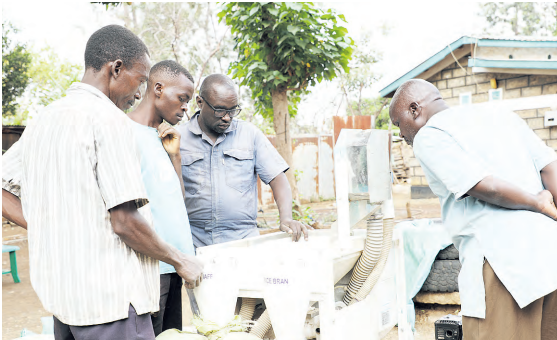

It’s good news for rice farmers in Meru, Tharaka Nithi and Embu counties as they stand to benefit from a portable rice milling machine.
The farmers will no longer have to travel longer distances to mill their rice, thanks to the machine.
Adelina Munywa, a farmer in the Mitunguu, Meru county, said rice farmers in the area have been contending with numerous challenges including travelling long distances to milling centres, high cost of milling and poor quality of processed rice.
“The smaller machine has been such a game changer for us. Before, we had to take our rice to Mwea, which is about 130km away. This was very frustrating because the transport costs were high, and the millers would also retain the by products, including the bran and the husks,” Munywa said.
Joel-Mark Kiania, a first-time rice farmer in the Chiakariga, Tharaka Nithi county, said this was his first season to plant rice.
“I planted a small trial crop to see how rice farming would work for me. The harvest was good, but I was concerned about where to mill such a small quantity. But now that the portable machine can come directly to us and mill even smaller quantities, it’s a huge relief,” he said.
Kilimo Trust programme officer Andrew Kasera said the portable milling machine will create new opportunities for farmers to enhance the value of their produce.
He added that the innovative machine breaks the milling process into two stages, resulting in brown rice and husks in the first stage, and white rice and bran in the second stage.
“This not only improves the quality of the final product but also produces byproducts that are economically valuable. This significantly reduces post-harvest losses and increases farmers’ earnings,” Kasera said.
He noted that rice milling machines are expensive, and given that rice farming is still new in the region, there’s significant hesitation among entrepreneurs to invest in large-scale facilities without guaranteed volumes of paddy.
“To address this challenge and support the adoption of upland rice, we decided to partner with Kilimo. Their smaller, portable milling machines offer a practical and cost-effective solution for small-scale farmers, allowing us to provide immediate support and encourage the growth of rice farming in our communities,” Kasera said.
Farmers can jointly or individually purchase the machines or hire from the company after harvesting, he said. In Kenya, rice is produced in the traditional rice-growing regions of Mwea and Ahero, but consumption has consistently outweighed production, forcing the country to spend billions of shillings in imports to plug the deficit.
According to the Kenya National Bureau of Statistics, annual rice consumption in Kenya is estimated to be over one million tonnes, while the production capacity is approximately 230,000 tonnes.
In 2023 alone, Kenya spent Sh54.7
billion to import 937,098.5 tonnes
of rice in order to plug the deficit.











